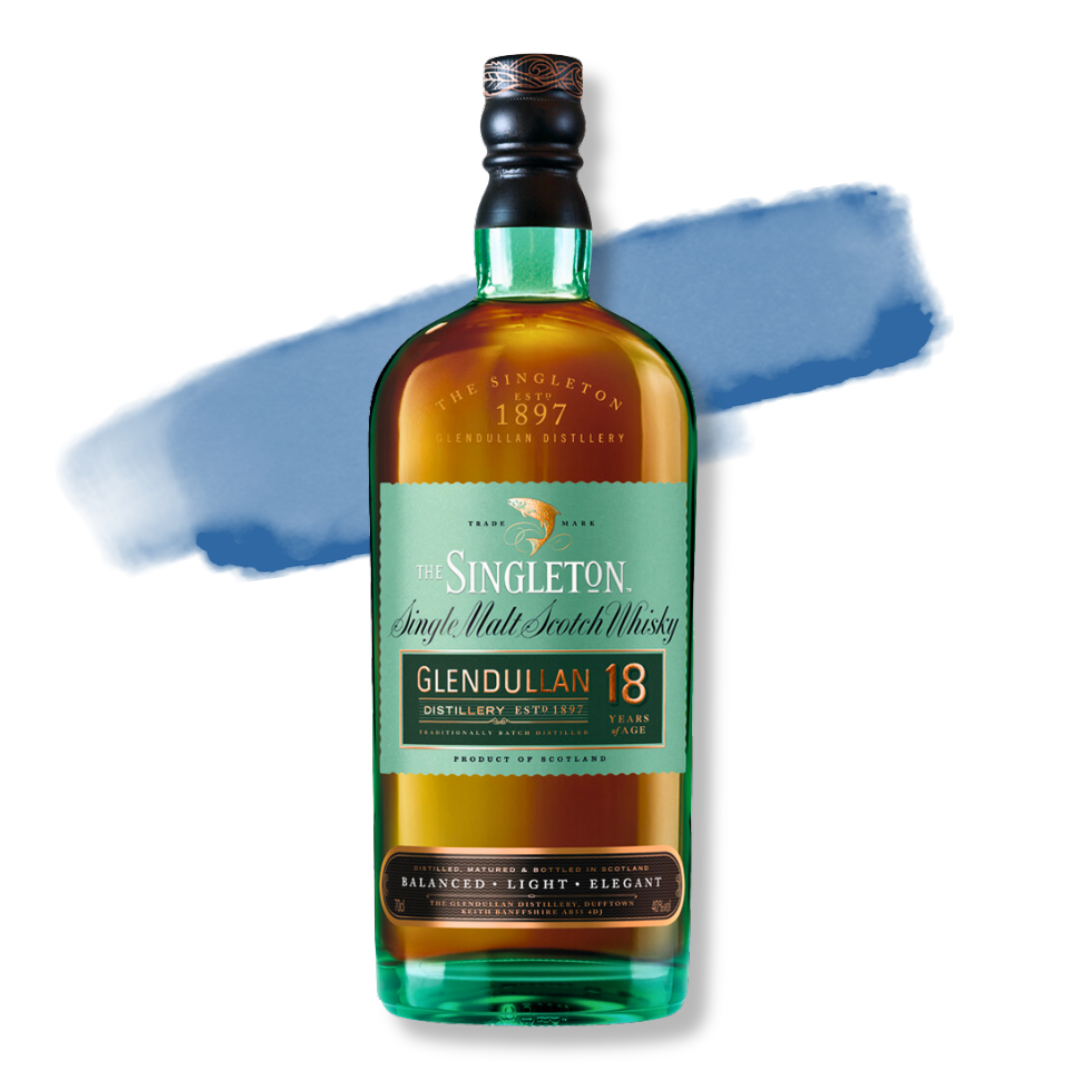Whisky Review: Singleton of Glendullan 18-Year Single Malt

Introduction
Today, we’re diving into a well-aged single malt scotch from the Singleton of Glendullan distillery: the Singleton 18-Year Single Malt Whisky. This scotch hails from one of three distilleries under the Singleton name, specifically the Glendullan distillery, located in the heart of Speyside. Bottled at 80 proof (40% ABV), this whisky boasts a blend of flavors matured primarily in American oak casks, with a touch of European oak to "balance the liquid," as the marketing copy claims. We’re excited to explore this 18-year-old offering, so let’s get into it.
The following review is taken from our episode "Paths of Glory / The Singleton of Glendullan 18-Year Single Malt." Click the link to listen to this review in audio format.
Nose
Brad kicks things off by noting the nose is nice, highlighting the presence of honey, fresh strawberries, and a touch of cinnamon darkness mixed with brown sugar. The combination creates a fruity and slightly spicy aroma that is both inviting and complex. Brad gives it an 8/10 for the nose.
Bob adds that the nose is surprisingly ethanol-forward for an 80-proof whisky, giving off a stronger alcohol scent than expected. Despite this, the standout note for Bob is pineapple, bringing a bright and unexpected tropical twist to the typical soft, fruity Speyside profile. He also gives it an 8/10 for the nose.
Taste
Brad continues with the palate, where the cinnamon warmth really shines through, complemented by vanilla and butterscotch. The caramel sweetness is balanced by a bit of spiciness, reminiscent of clove. The combination is intriguing and adds depth to the flavor. Brad scores the palate an 8.5/10.
Bob agrees that the palate is flavorful, though he finds it a bit thin and watery in terms of mouthfeel. Despite this, the whisky’s rich vanilla and tropical fruit notes, combined with an unexpected chili pepper-like spiciness, give it a unique character. Bob describes it as almost having a “Mexican palate” on a scotch, which he really enjoys. He gives the palate an 8/10.
Finish
The finish brings a noticeable shift from the sweetness of the nose and palate. Brad finds notes of dill, black pepper, and a slight vegetal quality, all underpinned by a surprising smoky, woodsy character. Although it’s not peaty, the finish evokes a campfire-like warmth that Brad finds captivating. He scores the finish an 8/10.
Bob, however, feels the finish doesn’t quite maintain the balance of the earlier flavors. The transition is a bit abrupt, moving from the sweet and spicy palate to a more bitter and smoky aftertaste. Bob finds the shift jarring and rates the finish a 7/10.
Balance
When it comes to balance, Brad acknowledges the whisky’s complexity, noting that while the flavors are interesting, they don’t always complement each other perfectly. He gives the balance a 7.5/10.
Bob echoes this sentiment, pointing out that the finish doesn’t seamlessly carry over the notes from the nose and palate, resulting in a slightly disjointed experience. He also rates the balance a 7.5/10.
Value
Now, onto the value. Brad notes that this whisky typically retails around $100, and while it’s a good scotch, the price feels a bit steep for an 80-proof offering. He feels that the whisky could use a bit more punch to justify the cost, ultimately scoring the value a 6/10.
Bob agrees that $100 is a bit high for what this whisky offers, especially when comparing it to other 18-year-olds like the Glenmorangie 18, which is priced slightly higher but offers more complexity. He gives the value a 6.5/10.
Final Scores
Brad’s final score comes out to 38.5/50, while Bob lands at 37/50. This brings the average to 37.75/50, or 75.5/100.
Conclusion
With a final score of 75.5/100, the Singleton of Glendullan 18-Year Single Malt Whisky is a solid offering, but it doesn’t quite hit the mark where we start raving. It’s certainly worth trying at a bar, especially if you’re a fan of Speyside whiskies with a twist. However, at around $100 per bottle, it might not be the best bang for your buck. If you find it for a good price, give it a try—but we’d suggest sampling it by the pour before committing to a full bottle.
As always, a score in the 35-40/50 range indicates a whisky that’s worth trying, but perhaps not a must-have for your collection.









